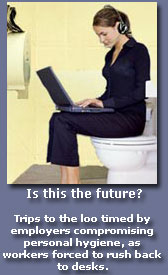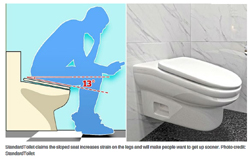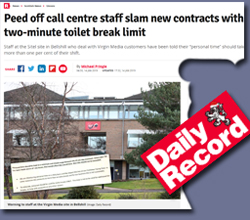New 'Inconvenient Toilet' Design Aimed At Controlling Worker's Toilet Time Habits
Employers are never content with the productivity of their staff, and use any methods they can to increase productivity even by timing s taff whilst in the loo, punishing them from taking too many ‘comfort breaks’ when in fact these visits to the toilet are a biological necessity.
Not doing so for long periods of needing to do so, can cause sistitis, bladder infections, constipation, and even result in damage to pelvic floor muscles and piles.
 With Amazon being the worst offender for punishing staff who need to use the toilet, the Call Centre industry is not far behind in terms of regulating the number of permitted toilet uses and the actual time spent walking to the loo, using it, and then returning.
With Amazon being the worst offender for punishing staff who need to use the toilet, the Call Centre industry is not far behind in terms of regulating the number of permitted toilet uses and the actual time spent walking to the loo, using it, and then returning.
If that wasn’t bad enough, now a British company by the name of Standard Toilets has designed a new toilet especially made to improve ‘staff productivity’ and not the poo and pee variety!
According to the website of the company which is based in Staffordshire, toilet use is not for the evacuation of one’s bowels, but used to text and use social media!
Quote:
’ It is estimated that in the United Kingdom alone, extended employee breaks costs industry and commerce an estimated £4 billion per annum…..
Our unique Patent Application, applicable UK and worldwide, offers the ability to increase business efficiency and profits through reductions in social media usage.’
However apart from the above claim being an over estimation, and the sign of a cruel inhumane employers that even quote such a Dickensian assessment, this next claims is completely inaccurate:
‘Moreover, medical studies have suggested that using the traditional WC can cause swollen haemorrhoids and weakening of pelvic muscles.’
So what is new about Standard Toilet’s latest toilet and design that will provide employers with increased productivity?
 Well, it is all about an "inconvenient" seat design and claims that it make it difficult to spend too long sitting on the loo.
Well, it is all about an "inconvenient" seat design and claims that it make it difficult to spend too long sitting on the loo.
The StandardToilet has a 13 degree-sloped seat to increase strain on the legs that feels similar to a squat, and it encourages people to want to get up after five minutes, the brand's website says.
Developer Mahabir Gill from the Staffordshire-based company said their toilets can be an asset to a business:
"It is estimated that in the United Kingdom alone, extended employee breaks costs industry and commerce £4 billion ($7.9 billion) per annum," he said.
According to StandardToilet's website, toilet breaks in workplaces have become a time for "private texting and social media" use.
The 13 degree slope is "not too inconvenient" for sitting on, but Gill said you'd soon want to get up as anything steeper "would cause wider problems".
He claims the toilet also provides health and wellbeing benefits through improved posture by engaging people's upper and lower leg muscles.
However, co-author of the Around the Toilet project Charlotte Jones said toilet breaks are important for employees.
"Viewing time spent in the toilet as a threat is the wrong way of looking at the issue entirely," she told Wired on-line magazine.
"I think the importance of the toilet as a refuge during the workday says more about inadequate workspaces, heavy workloads and unsupportive management, than it does about the workers themselves."
The idea for this ‘toilet of inconvenience’ came Gill’s experience as a consulting engineer for 40 years. He told Wired that he sometimes would discover workers asleep on the toilet, and in his free time, was increasingly annoyed by queues for public toilets.
The final straw came while he was shopping in a department store the morning after a particularly heavy night out, and in desperate need for a toilet, could only find locked cubicles. Thus, the idea for the StandardToilet was born.
Wired on-line magazine explains further:
The StandardToilet was given British Toilet Association (BTA) in November this year and retails between £150 and £500.
But, the whole question of controlling worker’s toilet time has become not your own personal right, but something to be gifted to you by the employer’s HR Dept!
 In January 2019, staff at a call centre in Bellshill, Lanarkshire, were asked to sign a contract forcing workers to register toilet breaks online, which were limited to a maximum of one-percent of their working day - over a four hour shift that would amount to two minutes, as reported by the Daily Record.
In January 2019, staff at a call centre in Bellshill, Lanarkshire, were asked to sign a contract forcing workers to register toilet breaks online, which were limited to a maximum of one-percent of their working day - over a four hour shift that would amount to two minutes, as reported by the Daily Record.
Gill is already in talks with several local councils and major motorway service stations to distribute his product, and believes their market extends to train stations, pubs, shopping malls and offices.
Currently, there are more than 6,200 contact centres in the UK employing around 1.3 million people, amounting to more than 4 per cent of the country's total working population. An estimated 896,000 people are also employed on zero-hour contracts, which includes almost 30,000 workers at Amazon warehouses.
But as this becomes more widely known we can expect the Civil Service and major telecoms companies with call centres to adopt this attack on human rights, along with the Tory government which is currently removing all EU worker’s rights standards from the statute book; in preparation for a UK/US trade deal. Once this deal is completed, we can expect US labour laws to be adopted by the UK.
Source: NewsHub NZ / StandardToilet / Wired / Daily Record

